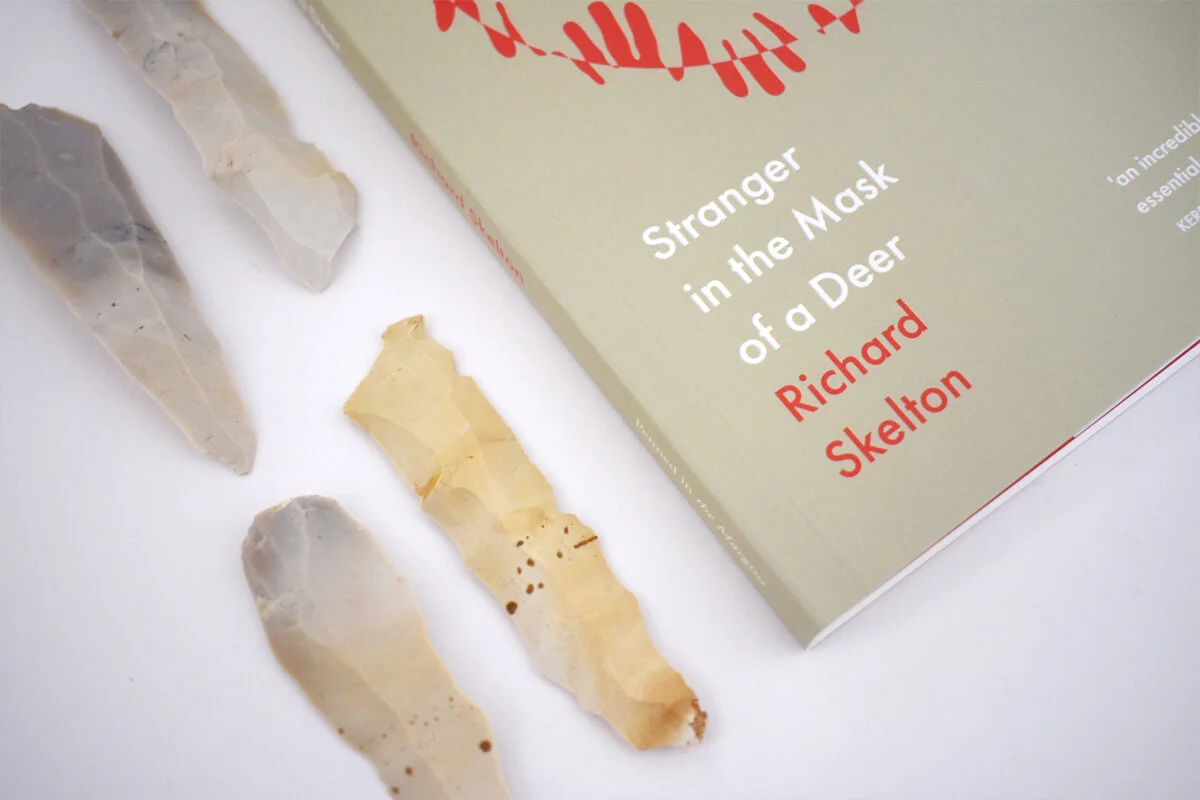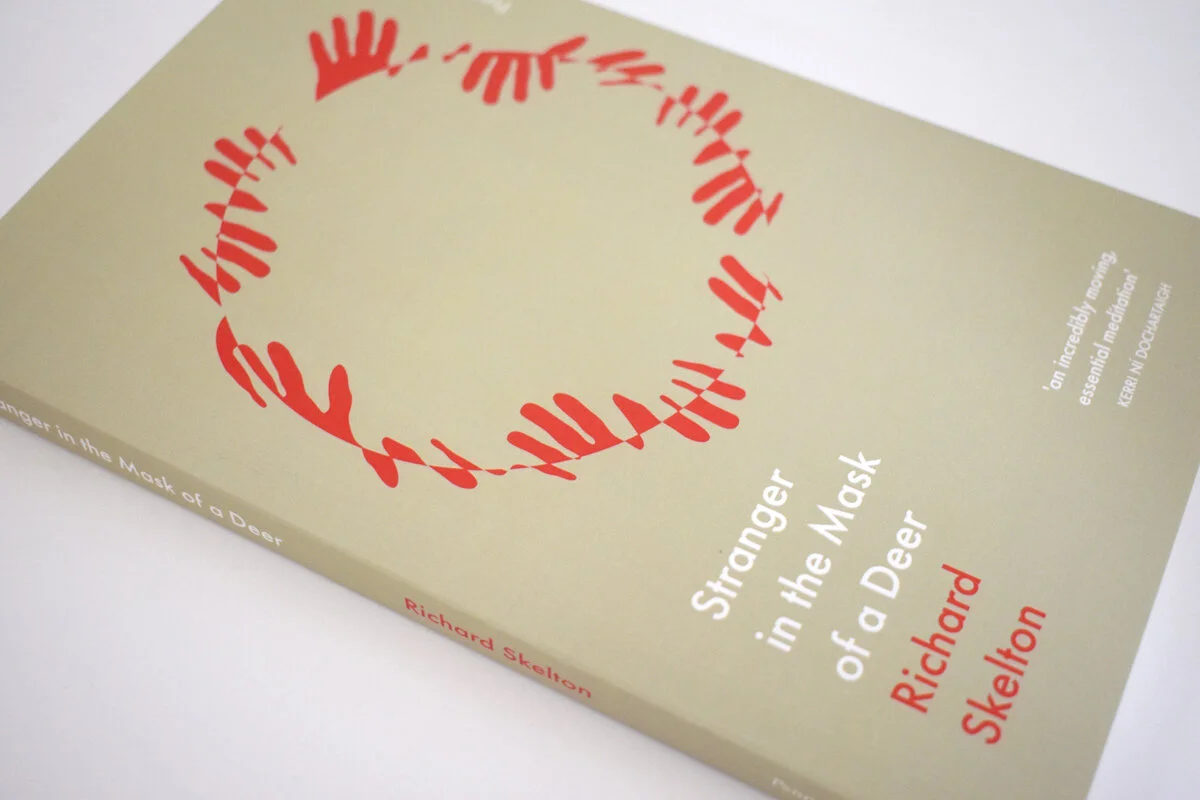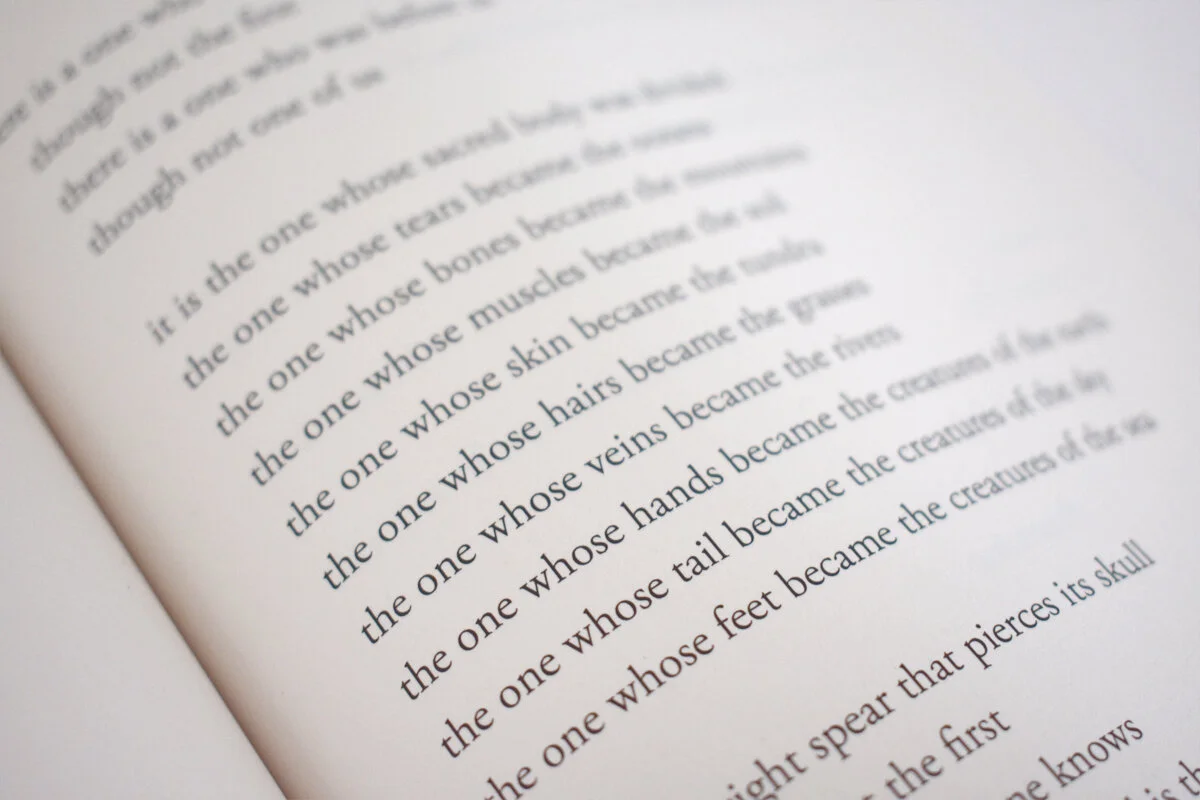‘Stranger in the Mask of a Deer’ by Richard Skelton
Review: Richard Skelton, Stranger in the Mask of a Deer, London: Penned in the Margins, 2021, ISBN: 978-1908058843, 166 pages
by: Peter Mark Adams
Richard Skelton’s latest work, Stranger in the Mask of a Deer, is a sustained, book-length exploration of the boundless metaphoric landscapes and symbolically rich deep-time of the mythical unconscious. Neoshamanic in conception as well as in terms of the artistic process employed to facilitate its emergence, the work consists of a symphonic sequence of interwoven poems whose varied narrative voices – poet, ancestor, the other-than-human – nevertheless retains its thematic unity through the carefully crafted waft and weft of its recurring leitmotifs. Those of lineage and bloodline; the crossover between and intermingling of human, ancestral and animal awareness; and the immanence of the spirit world. What makes this work especially significant is the spontaneous emergence of a higher order ethical vision resting upon our shared unity and interlinked destiny with all of the sentient life-forms that inhabit this world.
The narrative is structured around the tale of a journey; a journey that commences with a profound enervation and the consequent porosity that besets the persona opening it to the influx of influences, harbingers from beyond.
last winter whilst on medication for chronic pain i began to have
visions in the darkness at the edge of sleep (p. 39)
Rather than becoming the prey of such states, the poet adopts the role of the stalker, entering these dense, oneiric landscapes to search for structure, meaning, their occulted significance,
& i have tracked you for what seems like millennia
& i have tracked you until the time is right (p. 130)
To facilitate the hunt the poet utilises dream incubation – an archaic practice that bestows access to the transpersonal, atemporal strata of awareness. The operations of a participation mystique, ‘dancing between the shape of one thing & the shape of another’ (p. 106) are enacted through the intermediation of such archaic practices as the assumption of the identity of a spirit animal, masked dance, song, and the infusion of herbs,
& i put on the mask saved for this purpose
& the act of likening is upon me
& the act of likening is here
& i begin my song (p. 129)
Paradoxically, the ensuing soul-flight bestows access to the otherworldly realm of the spirits:
you who have travelled beyond the limits of the known
you who have flown with the animal others
among the stars above the earth
among the stars beneath the earth (p. 119)
In these myriad ways the writing fashions a narrative device that allows us to partake of this “likening”, this ability to access these broader swathes of awareness; for the anchors of our seemingly stolid persona are merely a certain unpracticed rigidity of awareness.
the boundedness of your body is a lie
your bounded mind a lie
your identity a lie (p. 67)
The poet commences his quest at the most symbolically proximate point of entry – the year zero of the aeonic retreat of the vast northern ice sheet fifteen thousand years ago:
terminal pleistocene
what did you dream of
all those millennia under the ice
such a long time
that even the fixed star itself
ceded to another (p. 27)
The emergence of the landmass reveals an unpopulated, trackless land not dissimilar to the uncharted expanses of the unconscious laying, inarticulate, beneath the persona, the soul’s pristine canvas that is also possessed of.
no roads no paths to follow no pilgrimage routes no drove
ways tracks or passes (p. 41)
The landscape, in its long drawn out birth serves as a mirror within which the poet can discern the evolving layers of self-hood through the mediumship of a shared lineage and bloodline; roots that stretch back into a vastly distant past; though remaining, nevertheless, never entirely lost, nor ever entirely “past”.
& when i look down i see my fathers hands
& he his fathers hands
& so on & so on
down the long human chain
father
grandfather
ancestor (p. 23)
The living lineage of the bloodline, the self’s occluded history, runs without interruption from those “living-in-this-world” through the portal of death to those “living-in-the-otherworld”; from the vast herds moving north behind the receding ice-sheet to the ancestral hunter-gatherers following in their tracks, whose mindset is attuned to that of the animal-others through the timeless traditions of the shaman.
So radical does the shift in the narrator’s awareness become that in an act of mediumship the ancestral unconscious arises to speak with an atemporal authority from beyond the narrow confines of the persona,
& remember this it said
the boundlessness of the world means that you are never
alone
there are always presences
always inherences
things beyond sight (p. 68)
The poetry eschews the familiarity that arises from casting its epic vision into a mythic mould; or, indeed, that offered by the various ethnographies of ritual. Likewise it eschews the romance of the “primordial” and the “primeval” in favour of an unmediated directness as the deep self answers the questions posed by the persona’s ceaseless inquiry.
& what was there before worship I said
respect it said
& before reverence I said
respect it said
& before sacrifice
respect (p. 76)
Discarding popular representations of the prehistoric, the conceptual space is cleared and rendered as a tabula rasa, a clean slate upon which an affirmative “transvaluation of all values” can emerge: an all-enfolding liturgy of the spirit.
& if you follow this way remember this it said
that animal has its own life & plant has its own life & stone
has its own life (p. 50)
These limpid lines, taut cadences, transport the reader back to states that partake of a more protean awareness and provide a bridge between contemporary modes of awareness and a poetically conceived perspectivism. But unlike Eduardo Viveiros de Castro’s economy of predators and prey, the shaman’s third way is an animism founded upon an acute awareness of the irreducible luminosity that lays at the very heart of our presence-in-the-moment, a luminosity that we recognise in and share with all sentient life.
they scatter the deer but one holds its ground looks at me
stares me down
& it is a deer & not a deer something other we both know it
but i can say no more (p. 131)
The very ineffability of such an encounter, of such shared understanding, exceeds that attainable through conventional channels of communication and points us towards the unmediated realisation of,
the possibility of sacredness in all things
the shimmer of life itself it said
the firedance of atoms (p. 50)
At 120 pages the work’s narrative is too long and too diverse to allow the reviewer to do more than attempt to capture its distinctive flavour, its epic breadth. Despite its profound metaphysical underpinings, at every point the writing, the narrative voice, remains acutely visceral evoking strong feelings and sensations; its texture is tightly woven to provide an immersive reading experience.
Stranger in the Mask of a Deer is, perhaps, the single most impactful sequence of thematically-linked poetry to have been written in the spirit and celebration of a pure and unadulterated paganism that I have encountered; one that combines its sinuous diction with an essential and ageless metaphysics.
I have spoken elsewhere of a generic “Orphism” in literary discourse – a “New Orphism” if you will – without wishing to delimit that term either by reference to academic discourse or to its Greco-Roman cultural nexus. Rather, I intend those poetic works for whom the sense of continuity between life-forms, and between the world of the living and the ancestral voices of the dead, forms an indissoluble unity. This rejection of the categories by which we, in modernity, have come to relate to the world, framing it as something “other”, as an exploitable resource, constitutes a wound in our sensibility that has done untold, and possibly irreversible, damage to the planet. This poetic sequence facilitates a re-membering of our awareness through a renewal of the vocabulary of the spirit; an essential step to repairing our relationship with nature and all sentient life. For language conveys culture and culture mediates our relationship with the natural world – whose degradation is, therefore, primarily an outcome of the relative poverty of conception that we call “modernity”. We stand on the edge of a precipice looking over, only the despised ‘primitive’ ancestor behind us – hidden in the deep-time of our own unconscious – can draw us back from the brink.
remember this it said
in the moment of your death
the knowing will come to you at last
the knowing that you have died innumerable times
& given death innumerable times
& returned innumerable times
& the joy in knowing that there is no end
& the horror in knowing that there is no end
& the circuitry of life ever repeating (p. 141)




